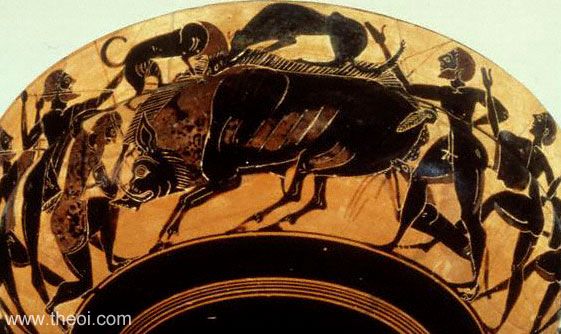 On our recent trip to the Pelopennese I was struck as to just how many oaks there were - big majestic ones lining the road over the mountains between Kalamata and Sparta, small scrubby sessile ones in the hills behind Kardymylli, and of course where you get oaks you get acorns, and acorns means pigs, and pig hunting was important to the ancient Greeks both culturally and as a source of protein. (It still in in the north of Greece, and is often the only meat other than the ubiquitous goat available at rural tavernas).
On our recent trip to the Pelopennese I was struck as to just how many oaks there were - big majestic ones lining the road over the mountains between Kalamata and Sparta, small scrubby sessile ones in the hills behind Kardymylli, and of course where you get oaks you get acorns, and acorns means pigs, and pig hunting was important to the ancient Greeks both culturally and as a source of protein. (It still in in the north of Greece, and is often the only meat other than the ubiquitous goat available at rural tavernas).Now a long time ago, long before I met J, I had a girlfriend who was doing a PhD in ethnobotany and was particularly interested in the use of nuts, including acorns, as a food resource by pre-agricultural populations in Europe, and hypothesised that these populations might have actively managed the forest to provide oak groves to aid the harvesting process, in much the same way as populations in PNG and some Australian aboriginal populations actively managed the bush to enhance the abundance of particular plants.
We know for sure that the Greeks ate acorns, there are literary references to the poor eating acorns, which would certainly provide an inducement for people to manage the forest for acorn production.
And half way up a Greek hillside it occurred to me that if this was the case, they would also have attracted pigs, making them easier to capture and kill. Now acorns are not the most enjoyable things to eat - they take time to prepare and they're pretty boring - I know as one of Sarah's predilictions was to experiment with these forgotten foods, and all I'll say is that having eaten them, I'd say they're up there with ground elder as something best left forgotten.
If you are curious there's a number of recipes on the web, or else you could try looking in a Korean supermarket for acorn noodles or acorn jelly - acorns were, and still are to a limited extent, also eaten in Japan and Korea.
Pigs of course have a different opinion about acorns. They relish them. And pigs fed on acorns taste particularly good, as the packs of acorn fed jamon serrano in Spanish supermarkets attest.
However I wondered if the presence of pigs as a resource made it worth continuing to maintain these oak forests and harvest acorns after people moved on from eating acorns as it attracted pigs and also helped the domestication process as the pigs hung around knowing that they would get acorns and other food out of season, so that instead of managing to forest for acorns they started managing the forest for pigs ...
No comments:
Post a Comment